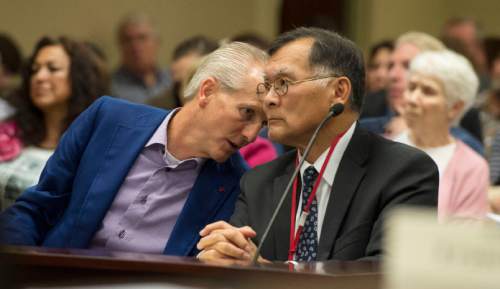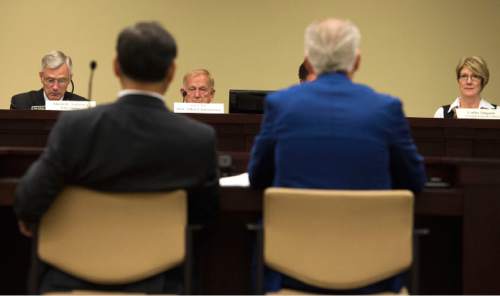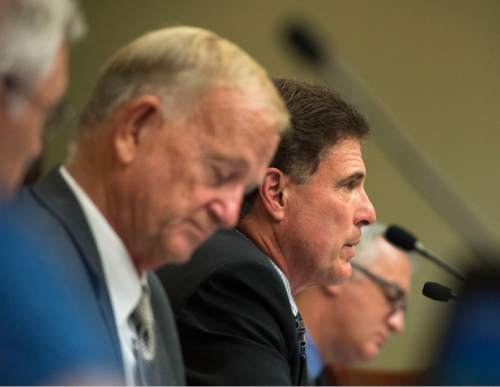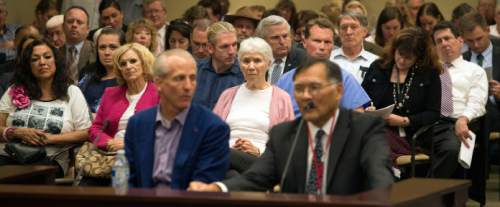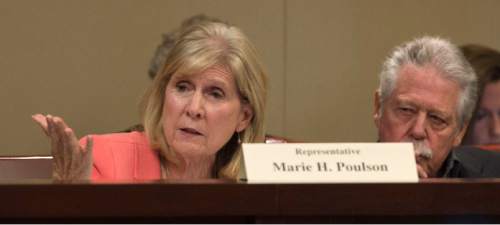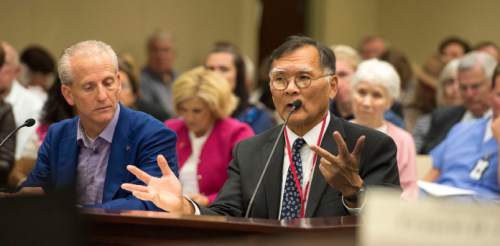This is an archived article that was published on sltrib.com in 2015, and information in the article may be outdated. It is provided only for personal research purposes and may not be reprinted.
Low-income Utahns pleaded with lawmakers Tuesday to pass legislation that they said could enable them to get urgent treatment for illnesses, but the proposal met with a barrage of criticism from doctors and other health providers who said taxing them to pay for the health care is unfair and damaging.
Members of the Health Reform Task Force heard hours of testimony about the recently unveiled Utah Access Plus proposal, the first and perhaps only hearing on the plan hammered out in months of negotiations between Gov. Gary Herbert and legislative leaders.
The message was mixed.
On one hand, low-income Utahns and advocacy groups pushed for expansion, arguing it would strengthen families, help the mentally ill and recovering addicts stay out of jail, and protect working from being bankrupted by an unexpected illness.
Melinda Turner, for example, said she has suffered from a number of ailments, including fibromyalgia, kidney stones and knee-replacement surgery that consumes her entire paycheck from her part-time job at a library. She lives with her parents without whom she would be unable to survive, she said.
"I strongly support this bill to help be able to have a life again instead of just staying home and paying everything toward medical [care]," Turner said.
Dan Davidson told the committee about his battle with mental health and substance-abuse disorders, how he was arrested for possession, and that he participated in a state drug treatment program. But when he was done with the treatment, he had no insurance to get the medications he needs.
"The people in the streets, we need help. We need insurance. We can't do without it," said Davidson, who has received assistance from the county for outpatient treatment.
Getting insurance for people like him, he said, would reduce recidivism and save the state money it now spends locking up people with substance-abuse problems.
But a parade of health care providers, who would be called on to pay for the expanded health coverage, expressed vigorous opposition to the slew of new taxes, assessments and fees.
Representatives from groups representing physicians, hospitals, anesthesiologists, chiropractors, optometrists, pharmacies and drug makers, health-insurance companies, mental-health providers, and plastic surgeons generally expressed support for expanding Medicaid coverage. It urged legislators to reject the new plan.
"We believe if the state decides to provide a service or program to the citizens of Utah, we do not believe you should tax those providing the service," said Michelle McOmber, executive director of the Utah Medical Association, which represents the state's doctors.
She argued that an $800-per-year increase in licensing fees would discourage doctors from offering charity care, although Senate President Wayne Niederhauser, R-Sandy, said the bill would not impose the fee on those providing such care.
Several doctors echoed the opposition, saying it punishes those the state is relying on to provide the care. One, Dr. Laura Nell Hodo, said she didn't like the tax but was willing to pay it, if necessary.
"We can do better than taxing the people who help," said Dr. Laura Nell Hodo. "If this is the best you've got, then I'll take it, because I'm tired of seeing people go without the care they need and I'm tired of seeing people die."
Greg Bell, former lieutenant governor and current president of the Utah Hospital Association, said hospitals are willing to pay their "fair share," but they are concerned that there is nothing to limit skyrocketing costs and would "strongly oppose an open-ended assessment" on hospitals.
"This is a critical provision," he said. "We could not support it."
Jonathan Johnson, the former CEO of Overstock.com who is challenging Herbert for the Republican gubernatorial nomination, blasted the proposal as another grab for federal dollars.
"This proposal signs Utah up for another $600 million or more of federal funding," Johnson said. "When will we stop looking to Washington for solutions and funding?"
The hearing illustrated the challenges ahead in trying to pass Utah Access Plus.
That is particularly true among skeptical House Republicans remains difficult, but the decision by House Speaker Greg Hughes to demand 38 votes from the 63-member House GOP caucus — dismissing the dozen Democrats in the body — before bringing it to a vote makes the challenge monumental.
House Majority Leader Jim Dunnigan, R-Taylorsville, said the testimony was valuable, and lawmakers may go back to the drawing board and make minor revisions to the bill before taking it to the caucus Oct. 13 to count up votes for and against the bill.
There are many ways you can fund this. We have presented one way," said Dunnigan who said the plan they came up with has more state flexibility than any other state in the country. Asked about the support in the House caucus, he said, "There's a mix."
However, even one of the architects of the bill, Sen. Brian Shiozawa, R-Cottonwood Heights, who is an emergency room doctor, expressed reservations about the assessments.
"It wouldn't be my first choice. It wouldn't be my second choice," he said. "I worry about rural physicians, I worry about doctors coming out of residencies with huge debts … and retaining those doctors. I worry about the proportion of uncompensated care and hospitals which are going to be clear beneficiaries in this program and … in other states have been willing to step up and shoulder the burden."
The Utah Access Plus proposal calls on health care providers — doctors, hospitals, pharmaceutical companies and others — to pay just more than $50 million in new taxes in order to receive a nine-to-one match from the federal government. That $450 million would be used to buy insurance subsidies for Utahns making less than 138 percent of the federal poverty level. That federal metric is $24,250 for a family of four, making the subsidy level about $33,000 for a family of four.
It was the product of months of negotiations after the House refused to pass Herbert's Healthy Utah proposal.
The House GOP will meet in another closed-door caucus on Oct. 13 to decide whether there is enough support to warrant Herbert calling a special session, possibly a few weeks later.
The Utah Access Plus bill is being drafted by a team of attorneys and, if it is passed by the Legislature and signed by the governor, would require the state to win approval from the Obama administration for a handful of waivers. The soonest it could be implemented would be 2017.
Niederhauser said that, if this bill passed, the Medicaid expansion issue "is not going away."
"This is going to continue to be an issue for many years to come, regardless of what we do. I guarantee it," he said. "I believe it's time to buckle in and figure it out. … I'm hoping we can come to settle upon something that works for Utah in the best way possible, in an environment that we didn't create, but we have to deal with it."
Twitter: @RobertGehrke


